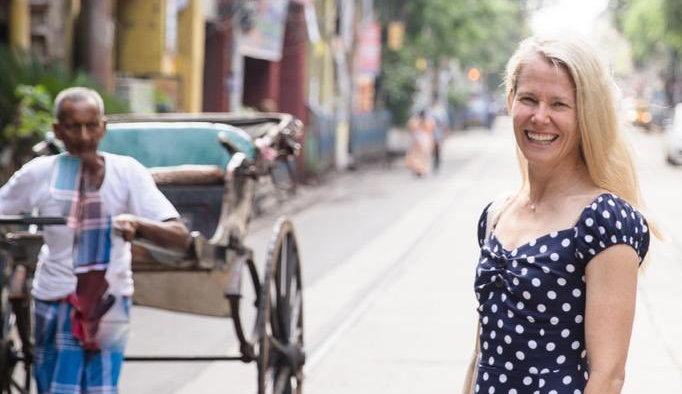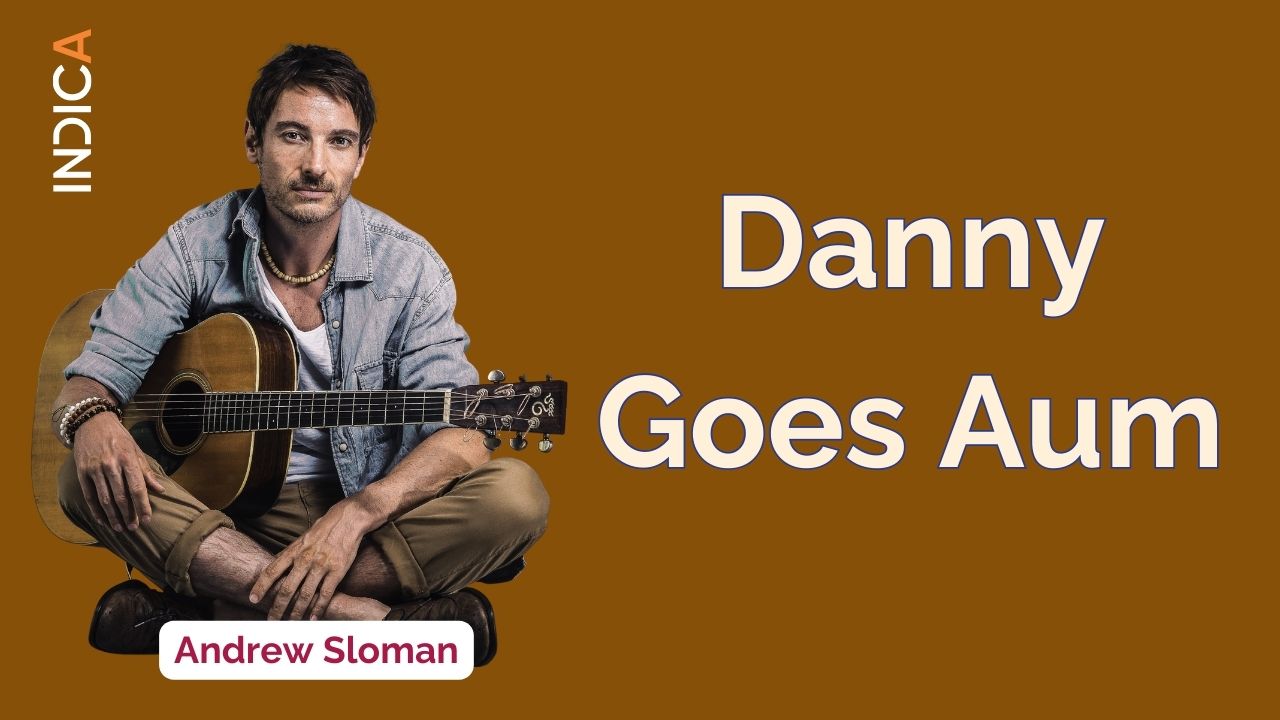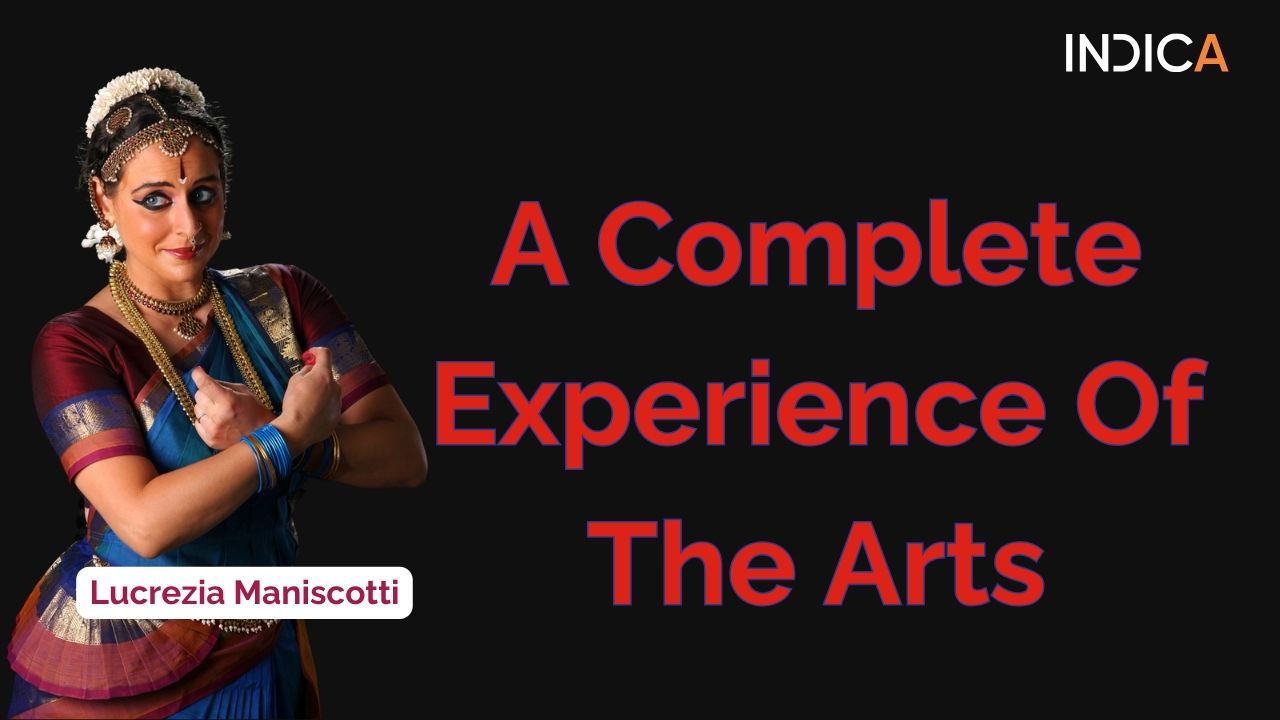“India has changed a lot between 1993 and 2022,” says Sarah Storey, and so has her relationship with India. While she was a backpacker in 1993, discovering India on foot and long train journeys, today, she is the Deputy High Commissioner of Australia to India. What hasn’t changed is Sarah’s love for Indian culture, its crafts and fabrics and festivals. A work trip to West Bengal necessarily involves buying handwoven sarees or temple tours in Tamil Nadu are combined with trying out the local cuisine.
Moreover, it is her vigour and openness to everything that can bring India and Australia closer that has kindled her love for India. With admirable enthusiasm, Sarah engages with people from different walks of life to explore opportunities that strengthen diplomatic ties. It is with this same enthusiasm, that Sarah spoke to the team of Indica Soft Power, sharing her insights on the multi-faceted India-Australia relations and opening avenues for deeper soft power engagements.
How have India-Australia diplomatic ties grown in recent years?
Our foremost priority is to promote Australia as a critical partner for India and seeking to sustain and further deepen our strong relationship. This forms the basis of our diplomatic ties and work in India. The very sincere and authentic connections built at the highest level, between the Indian Government with the Australian Government, all the way down to people to people, reinstates this point.
Our work at the High Commission in Delhi and also in Mumbai, Chennai and Kolkata is currently focused on promoting the announcements made around the 2nd India-Australia Virtual Summit in March 2022. This involves a 1500 crore package of partnership across segments of trade, security, climate change etc. The fact that Prime Minister Modi very graciously agreed for Australia to be just one of three countries with which India holds annual summits is wonderful. There are only two of us, including Japan being the other, that negotiated the Free Trade Agreement with India. The work is looking to deepen our engagement with practical efforts and we were really pleased to be able to do that.
I was also delighted with the recent Quad summit and our new government’s resolve in sustaining our rapidly deepening relationship, both bilaterally and also through the Quad. The Quad is certainly a core pillar of Australia's Indo-Pacific agenda. Within three hours of being sworn in, the newly elected Prime Minister Anthony Albanese met the Quad leaders, which was his very first international undertaking. Further, Foreign Minister Penny Wong had her very first interviews with the esteemed Dr. S Jaishankar. This sent very powerful messages about India-Australia relationships with room to grow.
 At At INS Hansa, the Indian Navy's largest air base.
At At INS Hansa, the Indian Navy's largest air base.
Together with India, we are largely focused on driving regional economic security. Being a prosperous nation, India ensures greater regional security. We are committed to strengthening our cyber security cooperation because without a doubt, our region is subject to sharper strategic competition. We are looking at clean energy supply chains, including scaling up renewable energy and a focus on critical minerals cooperation and better environmental and health security.
We also seek to establish partnerships of deep expertise, collaboration and complementarity that spans across sectors. Recently, we launched a collaboration between the Deakin University in Australia and TCS on artificial intelligence and machine learning. This allows Australian partnerships to collaboratively address skill gaps. Besides this, we are looking at vaccine initiatives and industry engagement between the two countries. We are looking to drive forward that agenda bilaterally but also through the Quad.
With a shared objective to ensure a free, open and prosperous Indo-Pacific, it is important to boost our relations through education and well-being. initiatives. This requires diverse kinds of engagements and collaborative efforts involving multiple people and institutions. Ultimately, a healthier and more economically prosperous region is more resilient and secure so we support India's natural leadership in the Indian Ocean.
What are some of the areas in which you are working to increase people-to-people and cultural relations between the two countries?
Broadly, we are looking to increase the familiarity and awareness of Australia in India. We are doing the same in Australia by building awareness about India. We want to make sure we depict and portray an accurate picture of Indian society. There are initiatives that present opportunities to the growth of business and trade ties, strengthening existing education, sports and cultural linkages. There is an emphasis on the tech sector with so many people of Indian heritage around the world heading some of the largest tech firms. Keeping India's growing expertise in this sector, we would be opening the Center for Critical and Emerging Tech Policy in Bengaluru next year, because that is the need of the hour.
I would also point to our shared indigenous history. We both have shared histories of rich indigenous art and culture, and we love to bring this to the forefront with campaigns, events, artistic exchanges, collaborations etc. It is very important to acknowledge India's rich and ancient culture; its arts and diversity are clearly among its strongest assets. And we can, in fact, learn a lot from you in this regard. I am constantly amazed as I keep exploring India's wonderful culture and find new facets to it. We are also exploring the idea of organising a Taste of Australia event to showcase some of our gastronomic culture and talents in India.
In terms of people-to-people relations, we try to celebrate the achievements of Indians in Australia and Australians in India and their journeys in their adopted countries. Through programmes like the Australian Alumni Grant Scheme, we celebrate Australian alumni in India and engage with them in many ways.
We are looking to boost cultural exchanges and learnings from each other as well. Some working and mobility rights will be offered to Yoga practitioners and teachers as well as Indian chefs because are the two elements that Australians cannot get enough of and we want to really continue to promote that cross-fertilisation. We are also looking to promote some traditional craft techniques and to create synergies between communities in Australia and India.
Can you tell us a little about the role of sports in bringing the people of two countries closer?
One of our strongest pillars of cultural connection has been sports. The Australian Indian Sports Education and Cultural Society promotes and strengthens bilateral ties.
We want to build opportunities in particular for women in the game. The Football Federation of Australia conducts workshops for female coaches. In support of the National Alliance for women's football and in partnership with CEQUIN, a local NGO, we are taking strides to build the profile of women's sports. This is something I am particularly passionate about and I would like to work more with India on that ambition. We are working to get Indians excited about the Australian Football League (AFL). We have already organised a few AFL games and conducted leadership training courses, including in Kolkata and Mumbai.
But sports cooperation is not just about bringing Australian sports to India. Kabaddi is being played in Australia, driven by our vibrant diaspora. The diaspora started local Kabaddi clubs and is bringing this fabulous sport to the broader Australian Community. I would love to see that become more popular and expand its following.

What are some of the achievements of the Indian diaspora community in Australia?
Around 730,000 Australians of Indian descent, which is a significant number for Australia. The community has grown five-fold in 20 years. In fact, in 2020, the second-largest group of overseas born residents will be in India.
The diaspora community plays an influential role in Australia’s multicultural society and democracy. The Indian diaspora contributes to our economy, business, politics, the judiciary, public service, science, the arts and civil society. Following the recent election, there are several Indian diaspora members finding a presence in Australia’s Parliament building along with those who were already in the state parliament. This was highlighted by the Australian High Commissioner to India, Barry O’Farrell in an interview sometime back when he said, “it is a remarkable testament to the power of the diaspora when the diaspora is actually contributing to representing Australia in the Australian Parliament.”
The diaspora plays a large role in building business links between our countries and deepening our bilateral economic relationship. The India Economic Strategy Update, for instance, is a call to not just governments but also to private businesses for optimum results and policies to be implemented.
A recent Australian government report titled Australia's Indian diaspora: A National Asset, further shows how the Indian diaspora is treasured. It sheds light on businesses working together across the Indian Ocean and what more we can do to harness the benefits of our complimentary economies. This is going to complement the Australia-India Business Exchange and help build awareness and linkages with Indian markers.
We have also recently announced a Center for Australia India Relationships that will be situated in Australia. We truly want to strengthen the connections with our diaspora groups. This requires a very clear roadmap that will drive people-to-people links between the two countries.
From our diaspora groups, we really want to strengthen some of those connections, so I would say there's a very clear roadmap. It is not just a vague intention to increase our ties but it is really backed up by this package.
In your opinion, how does the Australian community perceive India as a soft power in the region?
India is all about its rich culture and people. The intellectual prowess of Indian people is globally renowned with the tech community around the world largely being dominated by the Indian diaspora. Many people of Indian heritage are at the helm of leadership at the world’s largest tech firms.
I also think the Indian government has done an excellent job in assiduously and strategically building up the country's soft power by leveraging the traditional knowledge of Ayurveda and Yoga. The Indian Prime Minister, whenever he goes overseas, wants to tap into the diaspora and touch on the pride and achievement of the Indian diaspora.
However, the perception of India goes beyond Yoga, Ayurveda, the beautiful dance forms, crafts and fabrics and diaspora. India's development assistance to countries in its neighbourhood and further afield also demonstrates its credentials as a global and regional leader that has invested in the shared prosperity and security of the Indo-Pacific.
India's humanitarian assistance in times of need is a prime example of this leadership. And we are extremely pleased to see India making more forays into the Pacific Islands region, which is traditionally our backyard. The humanitarian and disaster relief assistance provided to Tonga in the aftermath of the undersea volcanic eruptions or COVID-related assistance offered to the Soloman Islands are some examples to demonstrate India's leadership in this region. This aid was facilitated by the Australian air force. This is the kind of collaboration in the Pacific that we would like to work on, with India, in a continued manner, while also expanding it beyond the Pacific.
I think that India's largest soft power tool, recently, without doubt, has been a generous vaccine export program that's played a vital role in combating COVID-19 around the world. I understand India supplied over 217 million COVID vaccine doses to the world, with many of these supplied to South Asia and Southeast Asia. Australia and India are working together through other services such as a facility called COVAX and through the Quad vaccine partnership to ensure the supply and equitable distribution of COVID vaccines. I also loved how India successfully integrated technology with its domestic vaccine program producing an outstanding digital platform COWIN and a one-stop register for vaccinations. This kind of leadership is really visible to the rest of the world.

With the team of Indica Soft Power at Bengaluru
What are some of your most cherished experiences of travelling across India?
Back in 1993, I had come on as a backpacker, discovering most of India through long train journeys. The longest one was 27 hours but in the end, I was enthralled by what India had to offer. I was all in to embrace Indian culture – palaces, historic sites, dances and other art forms and of course a lot of wonderful food. From the deserts in the west, I travelled overland to see the magic of Varanasi and then onwards, up to Nepal. In recent times, I have been on temple tours and walking in Chennai and in Kolkata. Not only did I understand India’s spiritual and artistic heritage but also got a chance to explore the hidden and lesser-known streets and corners, and just observe Indian people going about their normal day.
It has been a long time between 1993 and now and India has changed significantly, adding a lot more experiences. For instance, when I visited Bengaluru to situate our new Center for Critical and Emerging Tech Policy, I was extremely impressed by the city’s IT and entrepreneurial side. At the same time, I have also been fortunate to get away from big cities. On a recent visit to Sundarbans, where we are working with farmers, I was delighted to see just how much effort was being taken to preserve Indian culture. Beyond travels, I have enjoyed the celebrations of festivals in India such as playing with colors on Holi. I look forward to more such festivities.
Authors - Varsha Venkataraman and Arunima Gupta
Banner Image: Culcutta Photo Tours
All images are taken from the Twitter handle of Sarah Storey.




